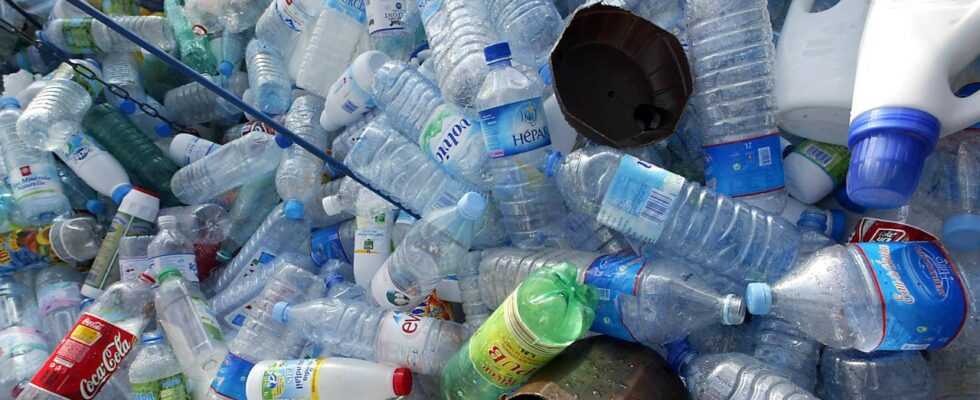ECOLOGY – As of January 1, 2022, plastic packaging is banned for many fruits and vegetables. We take stock of the bans on single-use plastic already in force, and those that are being prepared for the years to come.
ML –
Radishes, leeks, turnips, apples, clementines … as of this Saturday, January 1, 2022, it is now impossible to find in stores a large panel of around thirty fruits and vegetables wrapped in plastic, as soon as they weigh less than a 1.5 kg. Only certain products will be able to benefit from an extension by 2026, until the measure is put in place, such as red fruits, which are likely to deteriorate quickly without packaging.
Second tolerance measure within the framework of these restrictions: to allow the disposal of stocks, fruits and vegetables “produced or imported before January 1, 2022” packaged in plastic can still be offered for sale for six months.
Teas and herbal teas, blisters …
A measure set by the decree of October 8, 2021, as part of the anti-waste law of February 10, 2020, which provides for other prohibitions: as of this Saturday, it is no longer authorized to produce tea bags and non-biodegradable plastic herbal tea, details the website of the Ministry of the Economy. In addition, the production of packaging and bags made with oxodegradable plastic is also prohibited, a material often presented as more ecological because it can degrade on contact with light or heat, but which actually fragments into microparticles which can be found in nature and pollute it.
Also note, the plastic bags that cover newspapers and advertisements are now discarded, as well as plastic toys offered in the menus of fast food restaurants, notes the site Vie Publique. To limit the use of plastic bottles, establishments that welcome the public must also equip themselves with at least one water fountain. A set of measures and bans that have been added to an increasingly long list over the years.
Since 2017, single-use plastic bags banned from all shops
And for good reason, plastic containers pollute the environment as soon as they are not recycled. And in this area, France is falling significantly behind: in November, Citeo, the organization that collects recycling in France, admitted that the effective recycling rate of plastic packaging only climbed to 29% of those that are collected, i.e. six points more in just six years (23% in 2015), in contrast to our foreign neighbors whose rates climb to 50% for Germany or 46% for the United Kingdom, according to a study by PlasticsEurope in dates from 2016. A record far from Emmanuel Macron’s commitments to achieve 100% recycled plastics by 2025.
In 2019, a parliamentary report also highlighted the health risk posed by endocrine disruptors, present in plastic containers and likely to disrupt the hormonal system.
In an attempt to curb this scourge, the executive has decided in recent years to ban more and more packaging and single-use plastic objects. Since 2016, it has been impossible to obtain a single-use plastic checkout bag, whether paid for or not, a measure extended to all bags offered in points of sale in 2017 – except for biobased compostable bags, this is that is to say produced from biological or plant material, such as plants or bacteria.
Instead, paper, fabric or cardboard bags are offered. Before this ban, 5 billion single-use plastic bags were distributed each year at checkouts, bags that take hundreds of years to degrade and often end up in the oceans, poisoning marine species, Bercy reports. A business manager who does not submit to the obligation faces up to two years in prison and a 100,000 euros fine.
Read also
- VIDEO – End of plastic-wrapped vegetables: the radish packaging puzzle
- VIDEO – End of plastic-wrapped vegetables: the radish packaging puzzle
No more disposable cutlery for on-site meals in restaurants in 2023
As a result of this measure, restrictions have multiplied in recent months. Since January 1, 2020, it is the turn of disposable plastic cups, glasses and plates to be banned, as well as plastic still water bottles in the canteen in schools. Plastic cotton swabs are also prohibited from production.
As for confetti, straws, disposable glass lids, stirrers, boxes in expanded polystyrene (such as kebab boxes) and plastic cutlery, they disappear from shelves and restaurants on January 1 of the year 2021. Also prohibited to distribute plastic bottles in establishments open to the public.
The fight against single-use plastic is not expected to end. In 2023, we will no longer be able to use disposable cutlery in restaurants if we consume it on the spot, replaced by reusable dishes. By January 1, 2025, the law also requires the elimination of packaging made from styrenic polymers or copolymers, components that can be toxic if released into the environment and that cannot be recycled. Packaging that can be found on fresh products, for example.
By 2028 finally, local authorities with 2,000 inhabitants or more will have to eliminate all plastic food containers in school and university canteens, but also in certain health services.
On the same subject
The most read articles
Covid-19: 64 children hospitalized in intensive care, a record
Covid-19: Emmanuel Macron “really wants to piss off the unvaccinated”
Vaccine pass: these points that pose a problem to the opposition
LIVE – Covid-19: the bar of 20,000 hospitalized people crossed
Vaccine pass: tense exchange between Jean-Luc Mélenchon and Olivier Véran at the National Assembly
